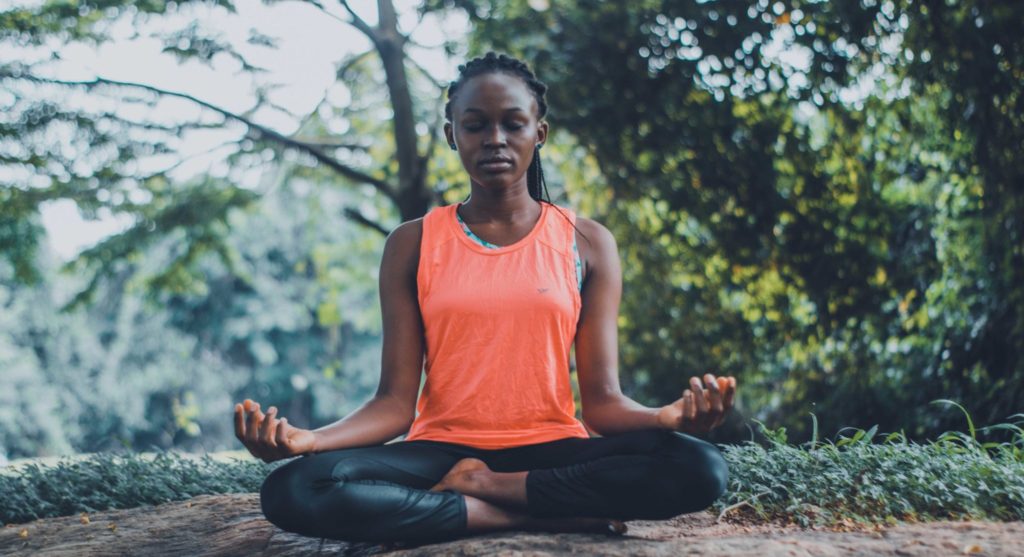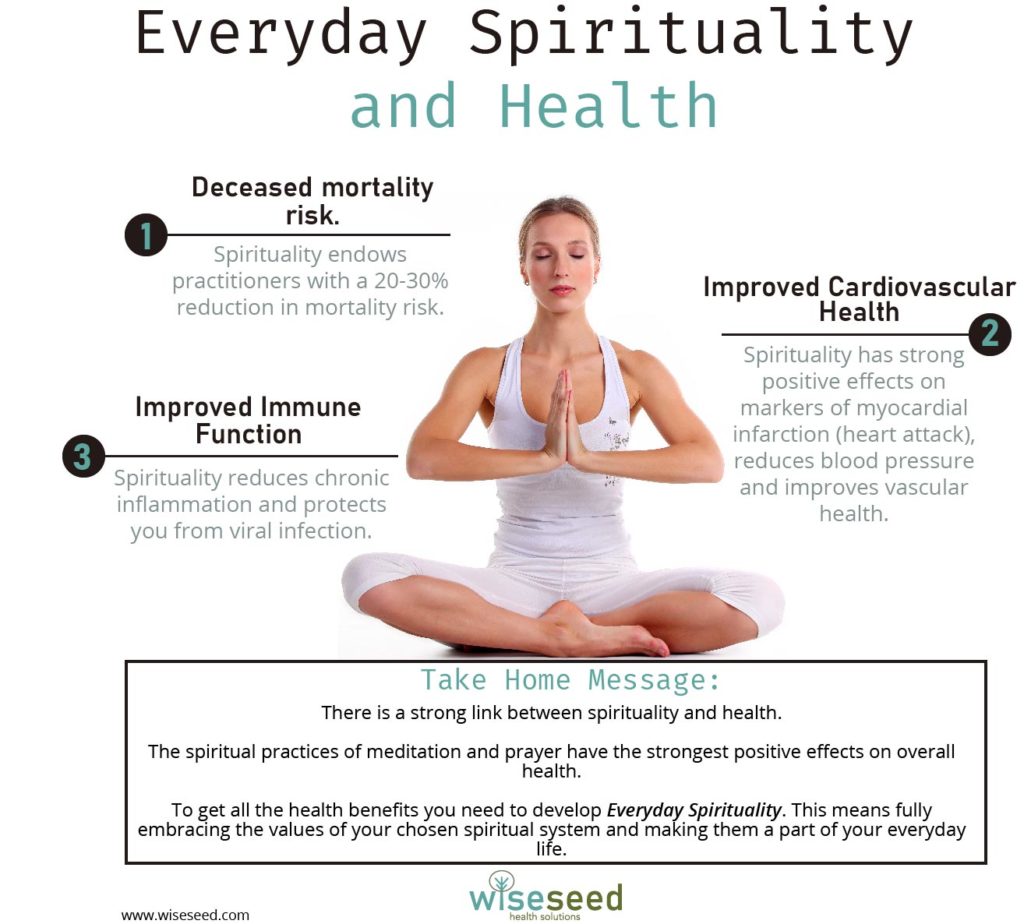Everyday Spirituality and Health

The Link Between Spirituality and Health
Here at Wise Seed Health Solutions, we are committed to increasing your everyday resilience. As we have previously argued, improving your spiritual domain increases your everyday resilience. Why? Because spirituality is tightly connected to your physical and psychological health.
The link between spirituality and health has been known for some time. For example, studies performed in the 1990’s (back when I still had a full head of hair!) show that spirituality endows practitioners with a whopping 20-30% reduction in mortality risk 1! Importantly, a recent analysis meta-analysis performed in 2009 confirmed the link between spiritualty and reduced mortality risk 2.
However, the link between spirituality and health is far from clear. For example, several studies have found no link between spirituality and health (e.g. 3), while other studies have found that spirituality has the opposite effect on the health of men versus women 4 !
What the Researchers Did
To get to the bottom of this conundrum, Shattuck and Muehlenbein recently analysed the data from 87 independent studies, specifically looking at the effects of spirituality on physical health 5. They began their analysis by breaking down spirituality into a variety of categories, and then examined which aspects of spirituality had the largest effects on overall health. Strikingly, the Author’s found that spiritual meditation has the greatest positive effect on overall health 5. Next was prayer, which has a smaller, but nonetheless significant contribution to health 5.
Spirituality is characterized as having either an intrinsic or an extrinsic orientation. For those who are intrinsically spiritual, their spirituality is incorporated within all aspects of life, and is deeply embedded within their sense of self. By contrast, extrinsically spiritual people are focused on the benefits that spiritualty provides, such as social and emotional support 6. Extrinsically oriented people primarily use spirituality as a method to enhance life, whereas the lives of intrinsically spiritual people are an expression of their spiritual values and beliefs 6.
The finding that spiritual meditation and prayer have the largest effect on health suggests that it is intrinsic spiritualty, not extrinsic spirituality, that provides the strongest health benefits 5. This finding is consistent with an earlier study, which found intrinsic spirituality is associated with positive psychological outcomes, whereas extrinsic spirituality is associated with negative psychological outcomes 7.
The bottom line is that if you want to derive the health benefits of spirituality, you will need to commit to the values and beliefs of your chosen spiritual system and integrate them into your everyday life.
In other words, you need to develop your Everyday Spirituality.
Which health markers are improved through spiritual practice?
Shattuck and Muehlenbein then examined which health metrics were impacted by spirituality. Importantly, the Author’s focused exclusively on objective laboratory and clinical measurements of health, which greatly increases the robustness of the study’s conclusions.
Cardiovascular Health
Spirituality has the strongest positive effects on markers of myocardial infarction (heart attack), blood pressure and vascular health 5. Spirituality has a smaller, yet still significant, effect on hypertension/stress and cholesterol 5.
Given that heart disease is the leading (pre-COVID) cause of death in the societies where the spirituality studies were performed, these results help explain how spirituality can reduce overall mortality risk.
Immune Function
Spirituality has a strong effect on reducing markers of chronic inflammation 5. Because chronic inflammation contributes to many age-related diseases, such as cardiovascular disease, diabetes and cognitive decline, this may also may help explain how spirituality reduces overall mortality risk.
Further, spirituality protects people from virus infection. Spirituality was found to protect people against viral infections in general 5. Spirituality also helps HIV patients maintain their immune cells 5, which may delay the emergence of the HIV-associated immune-deficiency syndrome.
Taken together, these results reveal that spirituality protects you against chronic inflammation whilst simultaneously boosting your ability to fight off viral infections.
Conclusion
Spirituality has long been known to reduce the risk of all-cause mortality. We now know that this is in part because spirituality provides protection against cardiovascular disease, chronic inflammation, stress and viral infections 5.
However, it’s worth emphasizing that you will need to develop your Everyday Spirituality if you want to reap the many health benefits of a leading a spiritual life. Everyday Spirituality means fully embracing the values and beliefs of your chosen spiritual system and making them a part of your everyday life.
Download the FREE PDF by clicking the link below.

References and Further Reading
1 Strawbridge, W. J., Cohen, R. D., Shema, S. J. & Kaplan, G. A. Frequent attendance at religious services and mortality over 28 years. Am J Public Health 87, 957-961 (1997).
2 Chida, Y., Steptoe, A. & Powell, L. H. Religiosity/spirituality and mortality. Psychotherapy and Psychosomatics 78, 81-90 (2009).
3 Fitchett, G. & Powell, L. H. Daily spiritual experiences, systolic blood pressure, and hypertension among midlife women in SWAN. Annals of Behavioral Medicine 37, 257-267 (2009).
4 Tartaro, J., Luecken, L. J. & Gunn, H. E. Exploring heart and soul: Effects of religiosity/spirituality and gender on blood pressure and cortisol stress responses. Journal of Health Psychology 10, 753-766 (2005).
5 Shattuck, E. C. & Muehlenbein, M. P. Religiosity/spirituality and physiological markers of health. Journal of Religion and Health 59, 1035-1054 (2020).
6 Coursey, L. E., Kenworthy, J. B. & Jones, J. R. A meta-analysis of the relationship between intrinsic religiosity and locus of control. Archive for the Psychology of Religion 35, 347-368 (2013).
7 Maltby, J. & Day, L. Religious orientation, religious coping and appraisals of stress: Assessing primary appraisal factors in the relationship between religiosity and psychological well-being. Personality and Individual Differences 34, 1209-1224 (2003).
Acknowledgements
Photo by Oluremi Adebayo from Pexels

Ten Minutes is All You Need
Research has shown that ten minutes of moderate-to-vigorous exercise performed each day is enough to significantly reduce your risk of early death.

Submaximal Training for Older Adults
A simple strength program designed for older adults to to increase bone density and improve strength, power and muscle mass.




